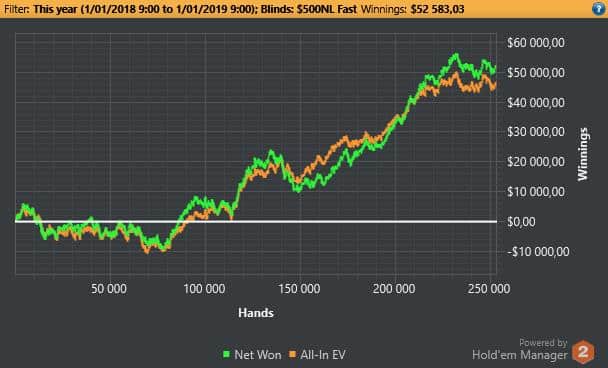|
|
 Originally Posted by MadMojoMonkey

I can give plenty of examples of the work in poker, but they only come to mind if you're not a casual player. If you're serious about making poker your career, then there are plenty of aspects of the game and its environments which will require work.
Poker is a game that relies equally heavily on mathematical skills and social skills. Those traits don't typically manifest in synch in one person. So unless you're a god of both math and people skills, you're going to be facing some hard work when it comes to forcing yourself to be good at something that you aren't really a huge fan of.
However for the casual player, you don't need to be really excellent at either math or people skills. You can take a purely intuitive approach to ranges and bet strategies and still be a winner at the bottom stakes. A hobby that actually makes money is a nice life hack.
I'm going to estimate my agreement with this at about 35%
First, I hate it when people immediately polarize poker players into "casual" and "professional" categories, as if there is nothing in the middle. Anything worth doing is worth doing well. So if you're a "poker player" then there really shouldn't be any distinction between you and a "professional poker player" other than number of hours and whatever skills are acquired through repetitive practice. Both players should be equal in terms of their stated goal "maximize dollars won".
So there are just "poker players", and that's it. Whether someone uses the winnings for bills, or adds it to their disposable income shouldn't determine what category of poker player they are. I kinda believe that's just something low stakes pros tell themselves so they can feel less bad about being a total degenerate. Contrary to what you see on ESPN, the life of the average poker "pro" is pretty shitty.
There obviously is another category and that's for people who are killing time, drinking for free, and simply "gambling". They'll never admit that's what they're doing though, so it doesn't seem worthwhile to dig into the distinction.
As for relying heavily on math and social skills, I'm still not 100% in agreement. First of all, we can almost throw the social out completely. Otherwise how could you explain the success stories in online poker? As for math, I think that's debateable. Obviously basics like pot odds, implied odds, the 2/4 rule, SPR, etc are important. But does anyone here really think you need to be a "god of math skills" to apply those principles? Figuring out range vs range equity at the table, or doing complex-ish combinatorics can be a little daunting I guess, but even then there are shortcuts.
The game really opened up for me when I let go alot of the math stuff. The simple math says, once your opponent takes does something with an exploitable frequency, then your response should be to take the counter measure 100% of the time. If we're playing Rock/Paper/Scissors, and you throw Rock too often, then my response will be to throw paper every time until you adjust. So in general, I see other players as either betting too much, folding too much, or calling too much. Once you figure out who is who, it's like you're cheating at Rock paper scissors. No math required.
|








 Reply With Quote
Reply With Quote










